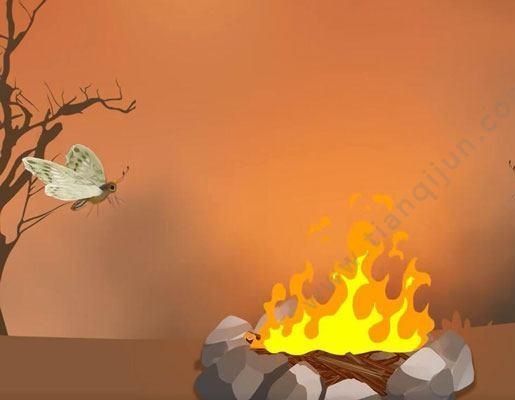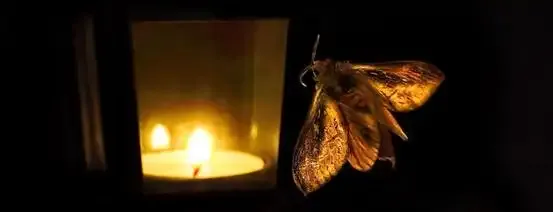
The term “like a moth to a flame” describes a behavioral characteristic of insects-- phototropism, which means that moths are often attracted by the flames of fire during nighttime flight and fly towards the source of fire regardless of the consequences. As a result, they are often burned or even burned to death due to their proximity to the source of fire.
During the Southern Liang Dynasty, Dao Gai was a court minister, and his grandson Dao Jin was exceptionally intelligent from a young age, skilled in writing poetry and essays, and highly appreciated by Emperor Xiao Yan. Once, while visiting the Beigu Tower in Jingkou with Xiao Yan, Xiao Yan asked him to write a poem, which was quickly completed by Jin. Xiao Yan joked, “Did your article be written by your grandson?” And he wrote a poem for Dao Gai, the gist of which is: Dao Gai worked hard all his life, like a moth to a flame. In order to illuminate others, he burned himself without hesitation. Now that he is old, he can let Dao Jin take over from his grandfather.
The allusion of a flying moth darts into the fire is not only a description of a natural phenomenon, but also a metaphor used to describe the behavior of those who pursue a certain goal or desire regardless of everything. The act of moths darting into the fire is used to metaphorically describe those who, in pursuit of light or profit, risk everything and may ultimately lead to their own destruction. This allusion emphasizes that people should maintain rationality and caution when pursuing their goals, keep a clear mind, and avoid the negative consequences caused by blind pursuit.
“飞蛾扑火”描述的是像飞蛾一样昆虫的一种行为特点——向光性,即飞蛾在夜间飞行时,常常会被火光所吸引,不顾一切地飞向火源,结果往往因为接近火源而被烧伤甚至烧死。
南朝梁时,到溉是朝廷大臣,其孙子到荩从小聪明过人,擅长写诗作文,深受皇帝萧衍的赏识。一次,到溉和到荩随萧衍游览京口的北顾楼,萧衍让到溉作诗,到荩迅速完成。萧衍开玩笑说:你的文章是不是孙子代写的?并为到溉写了一首诗,大意是:到溉一生辛苦,像飞蛾扑火一样,为了照亮他人,自己焚身也毫不吝惜,如今已经年老,可让到荩接替爷爷了。
飞蛾扑火的典故不仅仅是一个自然现象的描述,更是一种比喻,用来形容那些不顾一切追求某种目标或欲望的行为。飞蛾扑火的行为被用来比喻那些为了追求光明或利益而不顾一切的人,最终可能会自取灭亡。这个典故强调了人们在追求目标时应保持理智和谨慎,保持清醒的头脑,避免盲目追求而导致的不良后果。
